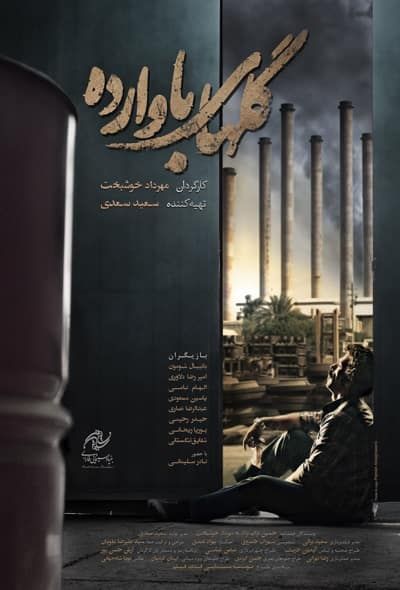
" Bavardeh Flowers" has another month and a half of work left. Have you seen a terrible movieered !
According to Mehr News Agency, the press conference for the film "Bavardeh Flowers," directed by Mehrdad Khoshbakht, was held on Friday, February 21st, in Pardis Mellat.
Khoshbakht expressed his condolences to the earthquake victims in Khoi, saying, "I offer my condolences to all those who have lost loved ones in these past few months. I hope that no innocent person remains imprisoned and that the problems faced by our colleagues are resolved as soon as possible."
The director stated, "While I was working on 'Abadan 11-60,' I was also thinking about this film. I strongly insisted that the actors be on an equal level of fame, and there shouldn't be a sudden star shining among them to maintain balance. We designed the entire film in Abadan, and the set decorations were done there as well."
Actor Heydar Rahimi expressed, "I extend my condolences to the people of Khoi and the people of Turkey and Syria. I had a connection with this project through a friend. I have roots in Bushehr and Abadan. I was born during the war, so I am familiar with guns and war. We were also affected by the war during that time. My father is a war veteran, and I understand the pain of the people of Abadan, both during and after the war."
Another actor in the film, Mohsen Ghaffari, said, "Since my interest in acting emerged, I wanted to work on a war film. When I went for an audition, I performed with an Abadani accent. My role was small, but I feel it was significant enough."
Saeed Barati, the cinematographer of the film, stated, "The version you saw was not exactly what we desired. As usual, the films we work on don't get distributed well in Iranian cinemas because we don't have any standard cinemas in Iran, and I'm sorry about that. We shot the night scenes during the day but transformed them into night scenes. I know it was inconvenient for everyone, and I hope we can deliver a better version soon so that everyone can enjoy watching it."
Hassan Izadi, the visual effects supervisor, explained, "In terms of visual effects, this project was equivalent to three projects. Each of its significant events was enough for an entire film. There were 403 visual effects shots in this film. The tanker on the verge of explosion posed a great challenge for us."
Khoshbakht also mentioned the investors of the film, saying, "I don't know if we should say that the oil company contributed a part of the film or if we should say Farabi Foundation provided everything. This is one of those things I didn't learn in cinema—to lie."
Regarding the Abadani-Tehran dichotomy, Khoshbakht stated, "I agree that we have underperformed in this regard, but our friends at Farabi Foundation provided us with intellectual support. We have different accents, but I accept this matter."
He said, "It wasn't our fault that the film didn't meet the deadline; it was a technical issue that occurred. In my opinion, the film was cursed. It was shown just five minutes before the scheduled time. If I want to tell the truth, I should answer later, so it's better not to say anything. But the delay was not our fault. I'm dissatisfied with this current version, apart from the fact that only 40% of our ideas made it into the film. Insisting on having the film in the festival resulted in a lousy version for you to see. They didn't let us complete the film. In general, our idea was a trilogy, and even if they kill me, I won't make any films for another year."
Khoshbakht explained about Hamid Farrokhnejad's presence, "Whether Mr. Farrokhnejad came to the film or not, the producer should answer that. I insisted that Abadani actors be present, and I think that's the best response."
Regarding the one-and-a-half-billion-toman salary of Hamid Farrokhnejad, he said, "I don't know if he received it, but lucky him. I wish they would pay us too."
The director stated, "I just saw the current version with you. We haven't seen the film in a theater before to know where its problems lie. That day, when the minister sat down to watch the film, I said I don't accept this version and left the theater because the film was incomplete. I said the film you're seeing will take another month and a half to finish. I didn't even stay to see what the minister's opinion was because it wasn't important to me. I think making such films in our country requires effort. All the kids here worked hard, and this could have been an easier task, but because there is no system for making big production films here, it's not possible to make a film."
He added, "The system needs to change. One of the problems I always have is that our cinema officials are not realistic. If a theater is empty of audiences, they should accept it. If Telegram is filtered, then why do we see festival news on Telegram? These are not political statements; they are social statements. If a film takes two months to make, we should accept it. It can't be solved with orders. Everything I said here was true. The most important thing I wanted to hear from you about this film is that it represents that time and this time. At that time, a few real people worked to save the refinery from being lost. If such conditions arise again, will four officials come and tell my corpse to move aside? At that time, some wanted to steal parts of the refinery. Three billion pieces were taken out of the refinery at that time. Can officials stand up from behind their desks and wear worker uniforms?"
- Hits: 123